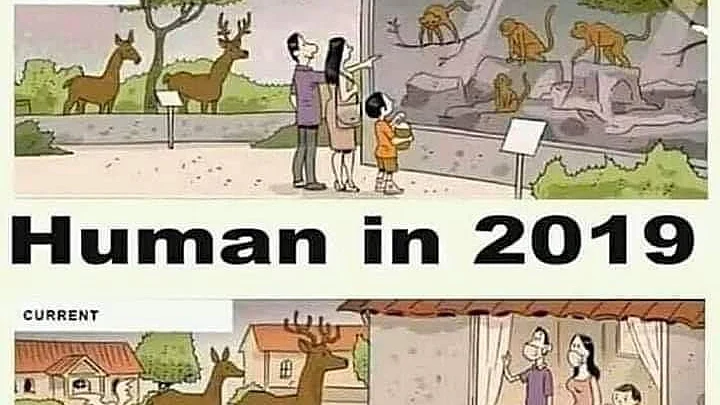Lockdown impact: Animals reclaim space in human habitat
The lockdown will facilitate enhanced free movement of animals never seen before on our roads and wildlife rescue teams will suddenly have a lot of work outside when people are working from home

Freedom of movement was so taken for granted that five days into lockdown seems like five years of confinement. Outings mean walking from the living room to the kitchen or the bed to the bath-room. In a confined space with others of our ilk, trying hard not to get into each other’s hair remains an insurmountable challenge as there are more than two weeks to go till freedom is announced (or not).It took a lockdown for public to empathies with zoo animals.
People in metros may thank this lockdown for the clean air and blue skies, never seen in the city many years gone by, but such clean air and clear skies are the norm where our teams work to conserve wildlife.It took a pandemic to control air pollution. Distressing images of thousands of migrant workers trying to catch the last bus home went viral, if one may use this terrifying allusion to the C word afflicting humanity. On the other hand, nature seemed to reclaim its space.
Footage of spotted deer, a civet and nilgai walking the once busy roads created a buzz amongst wildlife lovers.It took a virus to create space for other species. Tucked away in the congested lanes of Red Fort, Delhi is a flourishing market selling exotic fauna. Budgerigars, cockatiels, finches, Africangrey parrots, white mice.
These voiceless creatures were left locked in a shop once the nation-wide lockdown was enforced. It was only after the local police intervened at the behest of an animal welfare organisation,that the shop owner dispatched the keys to his shop and enabled the NGO workers to take custody of the starving birds and animals.It took police intervention to feed caged birds when human beings were living thel ockdown life.
Streets that are devoid of movement tend to become safe havens for wildlife. A leopard sauntered into the city of Chandigarh and entered a residential colony in the upscale locality of Sector 5 yesterday. While a camera fitted on a drone kept watch on the animal’s movements in the residence, officials from the forest department managed to tranquilise the leopard and take it away to a safe location.
Two scenarios would have played out in normal times: the animal would be attacked if seen by people, or the animal would have attacked had there been people in its way.The nationwide lockdown gave it a feeling of security on deserted roads and a sense of reclaiming its historical space that humans have now occupied.It took a national curfew to let people see animals outside of national parks.Meanwhile, miles away the veterinarian manning our Mobile Veterinary Service Unit at Dibru Saikhowa in Assam received a call to rescue a leopard from a tea estate.
The leopard had taken refuge in a culvert and was surrounded on both sides by people trying to grab a photo.In several parts of India, leopards entering human habitation are a norm. Considering the increased fragmentation of forests and increased interface between humans and wild-life, such situations are aplenty but happy endings are rare.
Fortunately, in this case neither the leopard nor the crowd was agitated – crowd it was,regardless of the COVID-19 scare that rural India has still not grappled with. The leopard was successfully tranquilised, transported to a safe place, revived and released in a safe habitat.
For the wildlife conservationists and field teams working with special permissions from the government is a necessity, COVID-19 or not.Leopards will continue to enter human dwellings as they rapidly lose their forests to human needs and greed and lives have to be saved,human and animal. It does not take a national lockdown to acknowledge the perils of saving animals caught in conflict situations while saving oneself from mob fury, which is the norm in most rescue cases.
However, this lockdown will facilitate enhanced free movement of animals never seen before on our roads and wildlife rescue teams will suddenly have a lot of work outside when people are working from home.
While the country applauds health care professionals, essential service providers and agencies on duty during lockdown, spare a thought and some gratitude for these unsung heroes who risk their lives 24x7 facing wild animals and angry mobs during conflict situations.It takes a woke audience to acknowledge a wildlife veterinarian’s contribution to society as they too are on call 24x7, COVID-19 or not.
(The author works with Wildlife Trust ofIndia. The views in this article are her own)
Follow us on: Facebook, Twitter, Google News, Instagram
Join our official telegram channel (@nationalherald) and stay updated with the latest headlines
